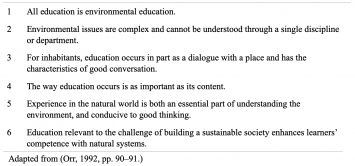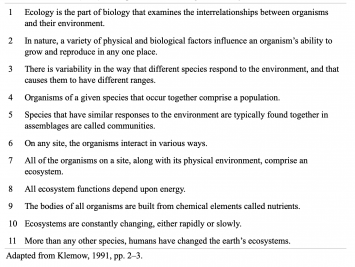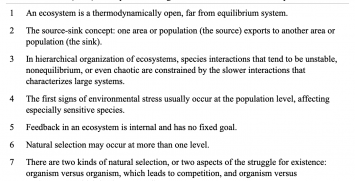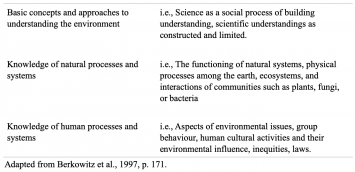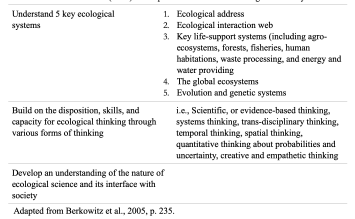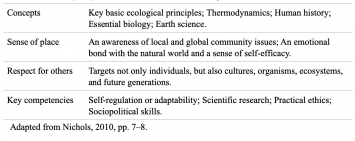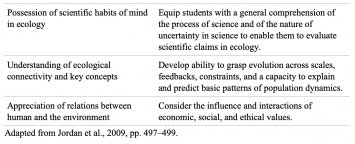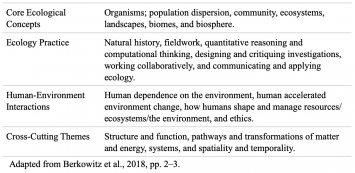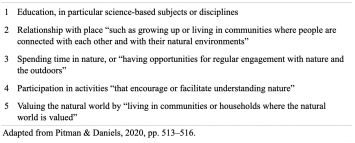Ecological Literacy: Definition, Early Articulations, Frameworks and Empirical Research
Link to the JSE March 2024 General Issue Table of Contents
Link to article PDF
Abstract: In the context of global ecological degradation, scholars and practitioners have increasingly emphasized the interconnectedness of education and ecology, with particular attention given to the concept of ecological literacy. Over the past decades, numerous definitions, approaches, and conceptual frameworks have emerged for ecological literacy, each associating it with various meanings and methods. This broad scope is a significant characteristic of ecological literacy as it underscores its interdisciplinary nature. However, for stakeholders in the field of ecological literacy as well as related domains such as environmental education and sustainability education, this plurality of meanings has become problematic because it creates confusion and makes the concept difficult to work with. This article assesses the concept of ecological literacy to enhance the general understanding among researchers and practitioners. It is structured into four main sections: definition of the concept, early articulations, frameworks, and empirical research. Finally, the article concludes with a discussion on the implications of these findings for environmental educators.
Keywords: ecological literacy, ecoliteracy, ecology and education, sustainability, environmental education.
Funding Details: This work was conducted as part of a master’s thesis and received support from the SSHRC of Canada.
The author reports no competing interests to declare.
Introduction
At a time when the planet’s ecosystems face significant pressure (Richardson et al., 2023), comprehending the functioning and limits of ecological systems and increasing collective awareness of the relationships between social and ecological systems is urgent. It is argued that the “survival of humankind will depend on our ecological literacy, that is to say, on our skills to apprehend knowledge from nature, to understand the basic principles of ecology, and to live accordingly” (Duailibi, 2006, p. 65). To take David Orr’s words (1992), “It all comes down to whether the public understands the relation between its well-being and the health of the natural systems” (p. 90). In this context, the concept of ecological literacy has emerged as an important avenue for education to focus on advancing a general understanding of ecological principles, developing the capacity to live accordingly, and creating sustainable human communities.
Over the past decades, the concept of ecological literacy has been put forward by scholars and practitioners in search of educational paradigms and practices focused on responding to social and ecological challenges (Jordan et al., 2009; Kahn, 2010; Monroe et al., 2023). Its conceptualization varies according to the disciplinary and cultural background of its contributors, and the emphasis put on natural processes and ecosystems versus social change, cultural diversity, and educational systems is relative. Such a plurality of meanings and means is a great strength. Still, it has become problematic for researchers, educators, and policymakers because it creates confusion, and it becomes difficult to coordinate action (Nichols, 2010). The fact that people—including scholars and practitioners—emphasize different dimensions makes ecological literacy very eclectic and difficult to work with (McBride et al., 2013). In other words, the concept is weakened by one of its greatest strengths, which is its interdisciplinarity.
The purpose of this article is to assess the concept of ecological literacy in the literature so that researchers and practitioners can find common ground and research synergies. The article is organized as follows. The next section outlines the methodological approach to searching and identifying ecological literacy literature. The findings are discussed as part of four main sections, namely the concept’s definition, early articulations, frameworks, and empirical research. The article ends with discussing what the findings mean for environmental educators.
Method
The review of the literature was conducted from January 2022 to July 2023 as part of a master’s thesis addressing the concept of ecological literacy. It began by looking up databases and using the keywords of “ecological literacy”, “ecoliteracy”, and “ecological education”. Articles were selected based on their relative focus on the intersections of education and ecology or the concept of ecological literacy. Articles that mentioned ecological literacy or another keyword but did not explicitly focus on those were eliminated. An effort was made to also include non-academic texts that were produced by educators and indigenous practitioners. The selected articles and texts were read, and the key information was synthesized in an annotated bibliography. This process led to the identification of four main themes for this review, namely a conceptual definition, early articulations, frameworks, and empirical research.
Definition of Ecological Literacy
The concept of ecological literacy has two main components in existing literature. The first relates to understanding social-ecological systems. For some, this means ensuring familiarity with key ecological principles by “teaching ecology in depth, in a systematic and multidisciplinary matter” (Duailibi, 2006, p. 66). Others, however, resist the focus on understanding facts and emphasize the sense of wonder and observation needed to truly understand social-ecological systems. For example, Debra B. Mitchell and Michael P. Mueller (2011) stress the notions of care and respect for others, rather than specific abilities:
Ecological literacy does not necessarily require the ability to read ecological literature or the ability to read at all. It does, however, include reading the patterns, cycles and systems of the Earth, knowing that the whole of the Earth as an ecosystem is greater than the sum of its many parts (Odum 1971) and realizing that human actions should nurture the integrity of the Earth. (pp. 196-197)
The second component of ecological literacy relates to one’s ability to engage with information and messages from the ecosystems, or the relationships that humans sustain with the environment. For example, Berkowitz et al. (2005) define ecological literacy as “the ability to use ecological understanding, thinking and habits of mind for living in, enjoying, and /or studying the environment” (p. 228). According to Lucie Sauvé, ecological literacy is the ability “to recognize that we are embodied beings, that our lives are situated and contextualized; to define our human ecological niche in relation with all the niches composing the local and global ecosystems we belong to; to learn how to fulfil this “function” adequately, in a responsible way” (2017, p. 117). In the same vein, Sheryn Dee Pitman and Christopher Brian Daniels (2020) assess that:
Ecological literacy is not just something that is helpful to have; it provides a critical foundation for making sound and sustainable decisions about how we live, how we grow and develop our communities and settlements, and how we address the environmental and socio-economic issues with which we are confronted. (p. 510)
From an educator’s perspective, ecological literacy is defined as a way to put the systemic integration and demonstration of principles of collaboration, sharing, and sustainable land use in educational institutions. In the view of Jeanette C. Armstrong (2005), the former executive director of the En’owkin Center, an Indigenous cultural, educational, ecological, and creative arts post-secondary institution in Penticton, Canada:
[Ecological literacy] means that we must strive to permeate all learning with opportunities for family and community to create lasting changes. It means programs that continuously give place for ritual and recognition of the individual within family and community. It means a curriculum consciously focused on experiencing happiness through meaningful service and on collaboration as the highest pleasures. It means that elders, parents, and community members are continually engaged in all aspects of programs and projects to ensure the full participation of all. (p. 83)
Early Articulations of Ecological Literacy
The foundational knowledge that underlies the concept of ecological literacy is rooted in ancient wisdom and has been taught through different means, across many societies, spaces and times, especially among indigenous communities around the world (Capra, 1999, p. 6). The contemporary wording “ecological literacy” is known to have been formally introduced by Paul Risser in 1986 during a speech at the annual meeting of the Ecological Society of America (ESA). In his address, Risser (1986) made it clear that ecologists have opportunities and responsibilities to collectively address a perceived lack of ecological literacy in the public (p. 264). This includes sharing important ecological facts, for example, that “everything is connected to everything” and that “we are part of a global community, connected by increases such as carbon dioxide, methane, and chlorofluorocarbons” (p. 267). He also advocated for a broader understanding of the relationship between ecological processes and cultural heritage so that “the relevance of ecology to culture can be unequivocally related” (p. 266). He recommended having the public know and appreciate places in their community and use this knowledge gleaned from the locality to form a basis for understanding other places (p. 267). By suggesting that ecologists could influence the ecological content of textbooks throughout school systems (p. 269), Risser started a key conversation on the integration of ecological literacy in formal schooling institutions and numerous ecologists noted his call to weigh in on the content and pedagogy of a framework for ecological literacy (McBride, 2011, p. 11). Since then, David Orr and Fritjof Capra have respectively positioned ecological literacy as a concern for general education and expanded the nuanced concept of ecoliteracy.
In 1989, Orr stated that “ecologically literate” means that one must have certain skills, like the ability to read or to use numbers. He also argued that ecological literacy is, as Garrett Hardin suggests, the ability to ask, “What then?”, which can best be described as a sense of wonder or an affinity for the living world (p. 334). In 1990, Orr argued that ecological literacy implies “a broad understanding of how people and societies relate to one another and to natural systems, and how they might do so sustainably” (p. 3). He also added a second layer to ecological literacy, which relates to the depth and speed of the crisis that is upon us:
It is to know magnitudes, rates, and trends of population growth, species extinction, soil loss, deforestation, desertification, climate change, ozone depletion, resource exhaustion, air and water pollution, toxic and radioactive contamination, resource and energy use; that is, the vital signs of the planet and its ecosystems. (p. 3)
In this iteration, Orr emphasized comprehension of the dynamics of the modern world and the ways human societies have become destructive of the natural world. He posited that the ecologically literate person appreciates “how social structures, religion, science, politics, technology, patriarchy, culture, agriculture, and human cussedness combine as causes of our predicament” (p. 3).
In 1992, Orr published Ecological Literacy – Education and the Transition to a Postmodern World, a very influential book that bolstered attention to the concept of ecological literacy. As a collection of essays on the crisis of sustainability and issues of curriculum and pedagogy, the book centers ecological literacy as a key topic for education and connects the ecological crisis to educational systems. It is stated that the ecological crisis is in every way a crisis of education and that ecological literacy requires a reconstruction of the industrial Western education system (p. 89). Orr stipulates that ecological literacy has, so far, been difficult for Western culture because it implies “an ability to think broadly and not compartmentally, to educate outdoors and through experience” (p. 89). He warns that when ecological perspectives fail to be included in school subjects, “students are taught that ecology is unimportant for history, politics, economics, society, and so forth” (p. 85). For ecological literacy to occur, Orr suggests that we must rethink “both the substance and the process of education at all levels” (p. 90). His approach is based on six foundations (see Table 1).
Despite his influence, Orr has been criticized for fueling short-term actions, stating crisis narratives, and suggesting fear of rather than love for the natural world (Mitchell & Mueller, 2011, pp. 204–205). Mitchell and Mueller (2011) denounce Orr’s deemphasis on science education and argue that science education should accentuate its focus on the notion of “care” (pp. 204–205). They suggest “biophilia” and “ecojustice” as two modes of extending Orr’s conceptualization of ecological literacy (p. 211). Biophilia is defined as “the notion that humans are innately drawn to the life and natural processes outside of human life” and ecojustice as an ethical approach that “brings into the foreground the moral consideration of species other than humans” (pp. 208-209). Mitchell and Mueller argue that both these concepts take “ecological literacy a step further to the consideration of morals and values within science education” (p. 209). Although Orr faces criticism, his work has had a tremendous impact on the field of ecological literacy. His view of sustainability as a preferred outcome for ecological literacy has been mirrored by many others in the following years (Berkowitz et al., 1997, p. 171; Jordan et al., 2009, p. 496). Orr’s work heavily influenced the movement for ecoliteracy.
Quantum physicist and systems theorist Fritjof Capra coined the concept of “ecoliteracy”, which he defines as a framework for educational reform focused on integrating principles of ecology in school contexts (Capra, 1999, 2007; Capra et al., 2004; Capra & Luisi, 2014). What distinguishes ecoliteracy from ecological literacy is the explicit focus on embedding educational institutions, viewed as systems, into principles of ecology. Capra proposes a curriculum that focuses on “fundamental facts of life” like networks, nested systems, interdependence, diversity, cycles, flows, development, and dynamic balance (Capra, 2005, pp. 23–29). He stipulates that through ecoliteracy, children learn key ecological ideas such as the facts that “ecosystems generate no waste”, “matter cycles continually through the web of life”, “the energy driving ecological cycles flows from the sun”, “diversity assures resilience”, and “that life, from its beginning more than three billion years ago, did not take over the planet by combat but by cooperation, partnership, and networking” (1999, p. 6).
To help young generations understand the principles of organization of ecosystems, a necessary step toward human communities that embody these principles, Capra suggests a systemic school reform that is based on “a new understanding of the process of learning and a new understanding of leadership” (1999, p. 6). According to him, all members of a learning community share leadership in the integration of ecological principles in the curriculum, which emerges through a project-based learning approach (p. 10). Capra adds that the arts, whether visual, musical or performing arts, are great assets to ecoliteracy as they represent a powerful tool for teaching systems thinking and for enhancing the emotional dimension (p. 5). The arts are particularly effective in developing and refining children’s “natural ability to recognize and express patterns” (p. 5).
Frameworks for Ecological Literacy
The perspectives set forward by Paul Risser, David Orr, and Fritjof Capra have been fundamental to ecological literacy, and the concept has since been anchored into various theoretical and philosophical frameworks such as the ones presented below. Efforts to produce frameworks as a way to delineate the essential components of ecological literacy expanded in the 1990s and were mainly advanced in the United States (McBride et al., 2013, p. 11).
In 1991, Kenneth M. Klemow (1991), Professor of Biology and Environmental Science, was among the first ones to argue that specific ecological concepts should be understood by every person by the time they enter adulthood. He suggested a list of eleven concepts that, in his view, should be understood by all (see Table 2).
In the same vein, ecologist Eugene Odum, who also advocated for the emergence of ecology as a new integrative science separate from biology (1977), came up with a list of basic concepts in ecology that would improve environmental literacy among undergraduate students (see Table 3). Odum was hoping that the human-ecology and the ecology-economics interface would become a major focus given “the increasingly serious global impacts resulting from human activities” (Odum, 1992, p. 542).
The initial focus on fostering understanding of ecological concepts expanded, eventually positioning ecological literacy as a key concept for environmental education. In 1997, Alan R. Berkowitz, Michele Archie and Deborah Simmons published an article in the Bulletin of the Ecological Society of America in which they share guidelines for excellence in environmental education. This is part of a project conducted by the North American Association for Environmental Education (NAAEE) and the Ecological Society of America (ESA). In their work, they emphasize the need to further explore the linkages between ecology and other disciplines in natural sciences, as well as in social sciences and the humanities when developing guidelines for environmental literacy and implementing them (see Table 4). Their work shifted the focus of ecological literacy from factual knowledge about ecological concepts to a more comprehensive notion of literacy and school reforms.
Alan R. Berkowitz, Mary E. Ford and Carol A. Brewer (2005) further embedded ecological principles in environmental education by proposing a framework for integrating ecological literacy, civics literacy, and environmental literacy in environmental education (see Table 5). With this conceptual framework, they aimed to provide clearer guidance for environmental theory, research, and practice (Berkowitz et al., 2005, pp. 233–234). While they reiterate that ecological literacy includes specific knowledge about key ecological systems, they also encourage various forms of thinking and a critical understanding of the role of ecological science in society.
Disturbed about the “worldwide loss of ecological knowledge”, Bryan H. Nichols questioned: “What does it mean to be ecologically literate in 2010?” (2010). To address this question, he conducted a conceptual analysis that aimed to define and validate what characterizes “essential ecoliteracy”. The results show four domains for essential ecoliteracy that, in his view, need to be known and understood by all to maintain a quality of life on Earth (see Table 6). Interestingly, Nichols (2010) expressly excludes the notions of action or agency from the domains, even if it is often included in the literature. He argues that essential ecoliteracy should provide people and communities with the capacity to act but not specify what those actions ought to be. In his view, education “should not be considered deterministic” as telling people what to do “can cause considerable backlash” (p. 8). This is a counterargument to presuppositions about what ecologically literate people ought to do or ought to be and a call to remain open-minded about its manifestations. The author also insists on the fact that ecological literacy is designed to be open, adaptable, and built on inputs from sources beyond the Western academic world.
Also concerned by the level of ecological literacy among general populations being too low to enable effective responses to mounting environmental problems, Rebecca Jordan, Frederick Singer, John Vaughan, and Alan Berkowitz (2009) came up with a framework for conceptualizing ecological literacy within the education sector (see Table 7). The authors argue that ecological literacy is not only necessary for understanding the natural world, but also for comprehending human interactions with it, and for making informed decisions about resource use and conservation (Jordan et al., 2009, p. 495). In their view, “ecological literacy must be part of a citizen’s lifetime learning experience, beginning in the primary grades and continuing through informal adult learning experiences” (p. 495). The authors present a framework that aims to be broadly applicable and guide both formal and informal educators (p. 496). With this work, the need for educational reforms became a focal point for ecological literacy. To implement such a framework in educational settings, the authors stress the importance of providing educators with focused guidance and up-to-date information. Their framework has three main components which address what educators should focus on when teaching ecological literacy.
In 2015, Thomas M. Lewinsohn and colleagues opened a new spectrum for ecological literacy by highlighting the importance of enabling professionals whose work touches on environmental issues to apply scientific knowledge in their work and make informed decisions (p. 154). Concerned with adult education, the authors suggest focusing on undergraduate courses and combining problem-based learning with clearly defined learning objectives. In their view, problem-based learning is an effective way of overcoming “the gap between the perception of ecology as a science and the real-world problems that the students will be exposed to as professionals” (p. 156). They also propose a shift from “content-centred teaching” to “outcome-based learning” in undergraduate courses. To do so, the authors propose four ways to put an outcome-based learning approach into practice (see Table 8), highlighting that doing so “will almost always require a collaborative effort with lecturers and researchers of different specialties” (p. 160).
Furthering the inclusion of ecological education as part of undergraduate disciplinary studies, a task force of ESA members, including Kenneth Klemow, Alan Berkowitz, Carmen Cid, and George Middendorf, developed the 4-Dimensional Ecology Education (4DEE) Framework. In 2018, the Governing Board of the ESA endorsed the 4DEE Framework. While the framework focuses on undergraduate education, it is also ready to be scaled to various educative contexts “from K-12 to professional levels” (Berkowitz et al., 2018, p. 2). Each of the four dimensions of the framework contains key topics, with some examples listed below (see Table 9). The authors define the framework as “a dynamic set of ideas that must be revisited and revised periodically” to provide not mandatory, but rather insightful recommendations for ecology curricula (p. 2).
The frameworks presented in the literature address several important aspects of ecological literacy, including what should be included in education for ecological literacy, guidelines for the integration of ecological literacy in environmental education in general, or in schools or undergraduate programs. The frameworks’ overarching themes include the basic concepts to understand the functioning of ecological systems (Klemow, 1991; Odum, 1992), the human processes of interactions with ecological systems (Berkowitz et al., 1997, 2018), and the appreciation of these relations (Jordan et al., 2009) by showing respect and adaptability to changes (Nichols, 2010). Yet, these frameworks are mainly based on academic research and do not include knowledge or perspectives from experts who are practically involved in carrying on these insights. The frameworks are designed to support practitioners in fostering ecological literacy in educational contexts but build on a top-down approach that does not necessarily reflect what is being done on the ground.
Empirical Research on Ecological Literacy
In parallel to developing frameworks, empirical studies have been conducted to develop educational programs that promote ecological literacy and determine the life experiences or pathways that shape ecological literacy. Studies show that ecological literacy activities do have an impact on students’ understanding of particular ecological concepts. For example, Eun Jeong Ju and Jae Geun Kim (2011) built and tested a program of seven activities using soil seed banks—including sampling, setting the soil, watering, identifying seedlings, and making observations—to promote ecological literacy among primary school-aged children. Their research was conducted in two urban elementary schools in Seoul, South Korea with 99 fourth-grade students, with two experimental groups engaged in the soil seed bank programme and a control group that followed the official textbook-based curriculum for studying lima bean seed growth. Results show that the level of understanding of concepts about the relationship between plant distribution and the environment increased significantly in comparison with a control group, and so did students’ knowledge about plants and plant ecology (Ju & Kim, 2011, p. 93).
Another example is the study conducted by Ana Célia de Brito Miranda, Zélia Jófili and Ana Maria dos Anjos Carneiro-Leão in 2017 to determine recreational activities that support ecological literacy with children aged 4-5 years old in a Brazilian school. They conducted four days of activities on the topic of the food web with nineteen children divided into three groups, with each group attending a different set of activities. Their findings show that play is crucial in early childhood education because it stimulates the involvement and curiosity of children—”awakening observation, attention and imagination – contributing to the development of oral and written expression and vocabulary expansion concerning their improved comprehension about animals and food relations” (de Brito Miranda et al., 2017, p. 204).
Empirical studies are also used to help determine the significant life experiences that shape ecological literacy. For example, Timothy Goodwin (2016) conducted a study with six selected prominent leaders in ecological literacy. He found that they all have a “tremendous ability to see the ‘big picture’ of a situation and think systematically”, that for some, this ability had been awakened and nurtured at a young age, and that they all rejected human exceptionalism (pp. 288-289). The interviewees recognized that all is connected on a biological level, saw the spiritual component of these connections, and had a strong sense of responsibility regarding their role in these systems (p. 288). Goodwin also emphasizes that a “well-developed ecological identity” connects all interviewees. In these lights, Goodwin stipulates those two things are needed to develop an ecological identity like those of the interviewees. First, “there needs to be a paradigmatic shift in how individuals view their relationship to the world, from one of dominator and owner to mere part of a larger system” (p. 289). Second, “there need to be experiences that allow the formation of an emotional connection to the natural world” (p. 289). For the K-12 curricula, these findings call for a focus on educative practices that integrate subject matters, a curriculum built around student questions, and a change in the paradigm of general science courses to focus more on outdoor experiences and connect the sciences to other disciplines (pp. 287-290).
With a similar objective, Sheryn Dee Pitman and Christopher Brian Daniels (2020) assessed the ecological literacy of a sample of South Australian adults. They conducted an online survey with 1010 participants. They found that no factor is more critical than another but that ecological literacy varies significantly according to a range of socio-demographic and psychographic characteristics “such as higher levels of education (and, in particular, science-based education), field of employment, engagement with nature both as children and adults, growing food, outdoor experiences and lifestyles, volunteering in environmental activity, growing up in small communities and learning through interaction with others” (p. 512). Based on these findings, the authors identify five pathways for growing eco-literate communities (see Table 10). Importantly, the authors point out the advantages of the diversity of ways in which these learnings can occur, the need to create opportunities for individuals and communities to engage in such pathways, and the need to identify barriers to engagement (p. 515).
While these studies are useful in showing the positive impacts ecological literacy activities can have on students and the importance of specific life experiences that build ecological identities and eco-literate communities, they do not examine the structure of these activities, nor how they can be incorporated into educational systems. The implementation of ecological literacy activities and projects remains vague, especially as part of formal education.
Discussion
Overall, ecological literacy involves the ability to “read” the socio-ecological word, but also to participate meaningfully in it and to live more in congruence with one’s place. As an approach to education, the general purpose of ecological literacy is to forge comprehension of social and ecological systems, increase awareness of current ecological issues and their interrelations with human societies and provide opportunities for action-oriented learning to take place. From its early articulations to its more recent empirical research, the concept of ecological literacy has evolved as a promising avenue for strengthening the understanding of social-ecological systems. Despite some gaps in the literature, especially when it comes to the implementation of ecological literacy and the integration of stakeholders’ experiences, the literature now provides tools for educators, professionals, and policymakers.
A review of the literature shows that scholars and professionals from the fields of education and ecology advocate for stronger integration of ecological principles in educational systems, but also in professional fields (Berkowitz et al., 2018; Lewinsohn et al., 2015). There is a consensus on the need for the general population to better understand social-ecological systems and develop a sense of responsibility regarding their role as part of these systems. The frameworks presented teach us what ecological literacy is, but also go beyond the teaching of ecology principles. Frameworks encompass what should be known by all to maintain a quality of life on Earth (Nichols, 2010), how to integrate ecological literacy as part of environmental education (Berkowitz et al., 2005; Berkowitz et al., 1997), how to involve the education sector toward ecological literacy (Jordan et al., 2009), how to enable professionals to make ecologically informed decision in their work (Lewinsohn et al., 2015), and how to integrate ecological education as part of undergraduate studies (Berkowitz et al., 2018). Moreover, empirical research demonstrates that ecological literacy activities do have an impact on people’s understanding of ecology principles (Ju & Kim, 2011). Spending free time in nature from an early age plays a crucial role in the development of ecological literacy (de Brito Miranda et al., 2017; Goodwin, 2016).
Sitting at the intersection of ecology, systems theory, sustainability, and education, ecological literacy opens promising research avenues for the theory and practice of environmental education (EE). Indeed, ecological literacy proposes several pathways for reaching some of these broad fields’ long-lasting objectives, which include building up a sense of values to contribute to public well-being through an interdisciplinary and problem-based approach (UNESCO, 1977). By addressing the social dimensions of environmental issues, fostering environmental justice, and enabling learners to comprehend the intricate relationships between human societies and the environment, ecological literacy answers Jickling and Sterling’s call for a “fundamental rethinking of education and its purposes in a rapidly changing global context” (2017, p. 6). By the same token, it contributes to the recent critical and action orientation of EE (Stevenson, 2007, p. 144). Indeed, by focusing on systemic change, the concept offers a bridge between the long-lasting contradiction between EE’s revolutionary purpose of transforming the values that underlie decision-making and the traditional purpose of schools of conserving social order (Stevenson, 2007, p. 145). Ecological literacy contributes to the burgeoning of relational worldviews in environmental and sustainability education (Jickling & Sterling, 2017, p. 7) and takes a stand on EE’s culturally dismissive approach (Bowers, 1996). Hence, it is part of a broader call to action for environmental education stakeholders to reimagine education from a systemic perspective to make it fit for the needs of the future (Monroe et al., 2023, p. 353).
The next step for ecological literacy is to enhance its implementation strategies so that a major shift toward sustainability occurs in educational institutions. To do so, ecological literacy needs to further refine its meaning based on the experience of practitioners. By closely reflecting the realities of on-the-ground educational experiences, ecological literacy is a key leverage point to catalyze a stop to global degradation.
Acknowledgments
I am grateful to my research co-supervisors at the University of British Columbia, Robert Vanwynsberghe and Claudia Ruitenberg, who provided feedback on this paper. I also truly appreciate the constructive comments of Simon Beaudoin.
References
Armstrong, J. C. (2005). Okanagan Education for Sustainable Living: As Natural as Learning to Walk or Talk. In M. K. Stone & Z. Barlow (Eds.), Ecological literacy: Educating our children for a sustainable world (1st ed, pp. 80–84). Sierra Club Books ; Produced and distributed by University of California Press.
Berkowitz, A., Ford, M. E., & Brewer, C. (2005). A framework for integrating ecological literacy, civics literacy and environmental citizenship in environmental education. Environmental Education and Advocacy: Changing Perspectives of Ecology and Education, 227–266.
Berkowitz, A. R., Archie, M., & Simmons, D. (1997). Defining Environmental Literacy: A Call for Action. Bulletin of the Ecological Society of America, 78(2), 170–172.
Berkowitz, A. R., Cid, C., Doherty, J., Ebert-May, D., Klemow, K., Middendorf, G., Mourad, T., & Pohlad, B. (2018). The 4-Dimensional Ecology Education (4DEE) Framework. Ecological Society of America.
Bowers, C. A. (1996). The Cultural Dimensions of Ecological Literacy. The Journal of Environmental Education, 27(2), 5–10. https://doi.org/10.1080/00958964.1996.9941452
Capra, F. (1999, March). Ecoliteracy: The Challenge for Education in the Next Century. Center for Ecoliteracy.
Capra, F. (2005). Preface: How Nature Sustains the Web of Life. In M. K. Stone & Z. Barlow (Eds.), Ecological literacy: Educating our children for a sustainable world (1st ed, pp. xiii–xv). Sierra Club Books ; Produced and distributed by University of California Press.
Capra, F. (2007). Sustainable living, ecological literacy, and the breath of life. Canadian Journal of Environmental Education (CJEE), 12(1), 9–18.
Capra, F., & Luisi, P. L. (2014). The systems view of life: A unifying vision. Cambridge University Press.
Capra, F., Orr, D., Tasker, M., & Selby, D. (2004, October). Ecoliteracy: Dancing Earth. Resurgence, 22.
de Brito Miranda, A. C., Jófili, Z., & dos Anjos Carneiro-Leão, A. M. (2017). Ecological literacy – preparing children for the twenty-first century. Early Child Development and Care, 187(2), 192–205. https://doi.org/10.1080/03004430.2016.1226353
Duailibi, M. (2006). Ecological Literacy: What Are We Talking About? Convergence, 39(4), 65–68.
Goodwin, T. (2016). Educating for Ecological Literacy. The American Biology Teacher, 78(4), 287–290. https://doi.org/10.1525/abt.2016.78.4.287
Jickling, B., & Sterling, S. (2017). Post-Sustainability and Environmental Education: Framing Issues. In B. Jickling & S. Sterling (Eds.), Post-Sustainability and Environmental Education: Remaking Education for the Future (pp. 1–11). Springer International Publishing. https://doi.org/10.1007/978-3-319-51322-5_1
Jordan, R., Singer, F., Vaughan, J., & Berkowitz, A. (2009). What should every citizen know about ecology? Frontiers in Ecology and the Environment, 7(9), 495–500. https://doi.org/10.1890/070113
Ju, E. J., & Kim, J. G. (2011). Using Soil Seed Banks for Ecological Education in Primary School. Journal of Biological Education, 45(2), 93–101.
Kahn, R. V. (2010). Critical Pedagogy, Ecoliteracy, & Planetary Crisis: The Ecopedagogy Movement. Peter Lang.
Klemow, K. M. (1991, June). Basic Ecological Literacy: A First Cut. Ecological Society of America Education Section Newsletter, 2(1), 4–5.
Lewinsohn, T. M., Attayde, J. L., Fonseca, C. R., Ganade, G., Jorge, L. R., Kollmann, J., Overbeck, G. E., Prado, P. I., Pillar, V. D., Popp, D., da Rocha, P. L. B., Silva, W. R., Spiekermann, A., & Weisser, W. W. (2015). Ecological literacy and beyond: Problem-based learning for future professionals. AMBIO, 44(2), 154–162. https://doi.org/10.1007/s13280-014-0539-2
McBride, B. B. (2011). Essential Elements Of Ecological Literacy And The Pathways To Achieve It: Perspectives Of Ecologists. The University of Montana.
McBride, B. B., Brewer, C. A., Berkowitz, A. R., & Borrie, W. T. (2013). Environmental literacy, ecological literacy, ecoliteracy: What do we mean and how did we get here? Ecosphere, 4(5), art67. https://doi.org/10.1890/ES13-00075.1
Mitchell, D. B., & Mueller, M. P. (2011). A philosophical analysis of David Orr’s theory of ecological literacy: Biophilia, ecojustice and moral education in school learning communities. Cultural Studies of Science Education, 6(1), 193–221. https://doi.org/10.1007/s11422-010-9274-6
Monroe, M. C., Eames, C., White, P. J., & Ardoin, N. M. (2023). Education to build agency in the Anthropocene. The Journal of Environmental Education, 54(6), 351–354. https://doi.org/10.1080/00958964.2023.2277209
Nichols, B. H. (2010, May 9). Essential Ecoliteracy, or “earth smarts”: Defining and validating a pragmatic educational construct based on quality of life. « Journal of Sustainability Education. The Journal of Sustainability Education. http://www.susted.com/wordpress/content/essential-ecoliteracy-or-%e2%80%9cearth-smarts%e2%80%9d-defining-and-validating-a-pragmatic-educational-construct-based-on-quality-of-life_2010_05/
Odum, E. P. (1977). The Emergence of Ecology as a New Integrative Discipline. Science, 195(4284), 1289–1293. https://doi.org/10.1126/science.195.4284.1289
Odum, E. P. (1992). Great Ideas in Ecology for the 1990s. BioScience, 42(7), 542–545. https://doi.org/10.2307/1311885
Orr, D. (1990, May). Environmental Education and Ecological Literacy. The Education Digest, 55(9), 49–52.
Orr, D. W. (1989). Ecological Literacy. Conservation Biology, 3(4), 334–335.
Orr, D. W. (1992). Ecological literacy: Education and the transition to a postmodern world. State University of New York Press.
Pitman, S. D., & Daniels, C. B. (2020). Understanding how nature works: Five pathways towards a more ecologically literate world – A perspective. Austral Ecology, 45(5), 510–519. https://doi.org/10.1111/aec.12883
Richardson, K., Steffen, W., Lucht, W., Bendtsen, J., Cornell, S. E., Donges, J. F., Drüke, M., Fetzer, I., Bala, G., von Bloh, W., Feulner, G., Fiedler, S., Gerten, D., Gleeson, T., Hofmann, M., Huiskamp, W., Kummu, M., Mohan, C., Nogués-Bravo, D., … Rockström, J. (2023). Earth beyond six of nine planetary boundaries. Science Advances, 9(37), eadh2458. https://doi.org/10.1126/sciadv.adh2458
Risser, P. G. (1986). Address of the Past President: Syracuse, New York; August 1986: Ecological Literacy. Bulletin of the Ecological Society of America, 67(4), 264–270.
Sauvé, L. (2017). Education as Life. In B. Jickling & S. Sterling (Eds.), Post-Sustainability and Environmental Education: Remaking Education for the Future (pp. 111–124). Springer International Publishing. https://doi.org/10.1007/978-3-319-51322-5_8
Stevenson, R. B. (2007). Schooling and environmental education: Contradictions in purpose and practice. Environmental Education Research, 13(2), 139–153. https://doi.org/10.1080/13504620701295726
UNESCO, U. (1977). The Tbilisi Declaration. 14–26.







